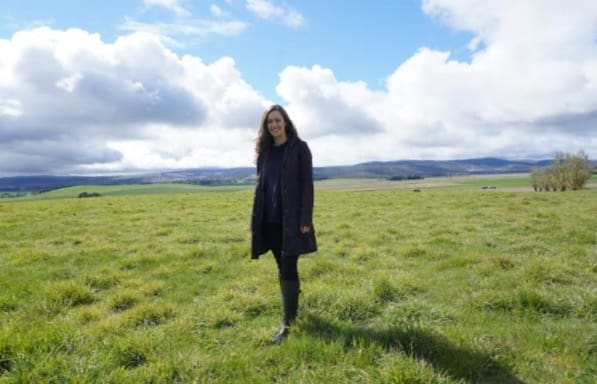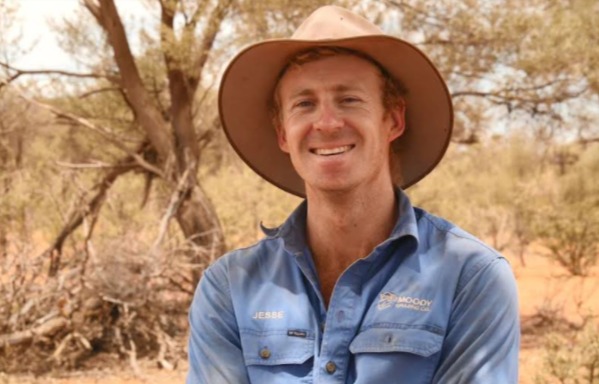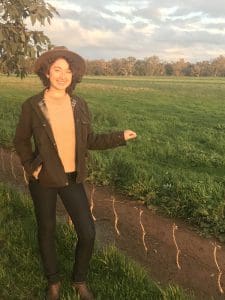
Tasmanian grower Colette Glazik wants a fairer system for wool carbon accounting.
MAKING greenhouse gas auditing fairer for wool, pastures more resilient for sheep operations and grass-finishing of lambs profitable are the goals of some of the latest 2022 Nuffield scholars.
Heading the sheep and wool cohort in the 2022 Nuffield draft are Queensland sheep and goat farmer Jesse Moody, Victorian prime lamb producer Jessica Conlan and Tasmanian wool producer Colette Glazik.
Wool operations need a fairer carbon auditing process
Colette Glazik at Ross is supported by Australian Wool Innovation in her research into fairer ways to audit the greenhouse gas emissions from wool production.
The former public sector employee and qualified lawyer, and her partner Joey McKibben and their two children moved to her parents’ farm, ‘Lewisham’ at Ross, Tasmania, where they run a self-replacing Poll Merino flock.
“We have a strong focus on sustainability and animal welfare – we were early adopters of the Responsible Wool Standard certification in Australia,” Colette said.
But when a long-time wool buyer asked the family to have their farm’s carbon emissions assessed, she found the methodology used did not take into account the low input farm’s cell grazing principles and exclusion of substantial areas of old growth tree from livestock. This resulted in the wool operation having a poor carbon credit rating, she said.
Colette will compare methodologies and data used to conduct carbon audits on wool producing sheep farms in Australia and internationally. She will also seek to understand which on-farm practices are helping wool producers achieve carbon neutral (or low carbon emissions) status.
“I hope that my research will provide wool producers more clarity on their path to carbon neutral farming.
“I would also like to identify areas of current carbon accounting methodology that require further research with the aim of finding solutions that can be adopted by policy makers so carbon accounting is fit for purpose for wool growers.”
Colette plans to travel to New Zealand, Argentina, Portugal, Italy, the United Kingdom, Germany and South Africa, to research her topic to ensure the long-term competitiveness of the Australian wool industry.
Soil regeneration with grazing is Jesse’s aim

Jesse Moody believes there is a clear correlation between soil and livestock health.
Jesse Moody runs 700 Merino ewes and 1600 joined rangeland goats on 40,000ha near Cunnamulla in south-west Queensland and has recently purchased 150ha at Tenterfield in northern New South Wales.
Supported by Rabobank, Jesse will investigate how to develop more resilient, drought-tolerant soils and pastures because he believes there is a clear correlation between soil health and the success of livestock production, particularly in a drought.
“In the Mulga lands and black soil flood plains of western Queensland our conventional grazing practices don’t seem to working as effectively as they once did, especially with the seasons becoming more variable,” Jesse said.
“In a drought, our soils go backward and so does our business, so that it can take years to recover.
“It comes down to maintaining ground cover through controlled grazing, and that’s the focus of my study – managing soil health to promote pasture management and drought resilience through grazing principles that promote soil regeneration,” he said.
Jesse plans to visit grazing experts and soil scientists in New Zealand, Argentina, the United States, Namibia and Zimbabwe in Africa, as well as local researchers and regenerative grazing proponents. He is a member of Queensland’s Leading Sheep producer advisory panel and his topic aligns with Australian Wool Innovation’s ‘Wool 2030’ strategy’s focus on regenerative agriculture.
“I’ve spoken with local producers who share my concerns about developing more resilient, drought-tolerant soils and pastures to handle the increasing variable climatic conditions, which would in turn, increase our carrying capacities, allow us to boost our flock sizes and at the same time, ensure a stronger, healthier business,” Jesse said.
Lamb operation is moving to a regenerative system

Tasmanian lamb producer Jessica Conlan.
Victorian lamb producer Jessica Conlan will use her Nuffield Scholarship, supported by the William Buckland Foundation, to research better ways to finish lambs on grass.
Each year, Jessica and her mother, Jo, sell around 2000 heavy lambs off their farm ‘Tumbywood’ in Elmore, Victoria. The sheep graze improved pastures and in drier conditions lambs are finished on grain, but the Conlan’s are transitioning the farm to regenerative agriculture to boost productivity and resilience.
Last year, they planted 3500 trees, switched to a no-till sowing system and sowed several multi-species cover crops to be rotationally grazed.
“We were amazed by the growth rate of the lambs on the multispecies crops.
“It was also a great learning experience to see the sheep choosing to graze different species throughout the season,” Jessica said.
With an increasing global appetite for grass-fed meat, Jessica believes Australian lamb is well placed to take advantage of this trend.
“The MLA Global Consumer Tracker shows that Australia’s largest lamb importers, China and the US, will pay more for Australian lamb due to good animal welfare, safety, quality consistency and higher nutritional value.”
Resilience is a strong focus of 2022 scholarship recipients
The new Nuffield scholars were among 12 recipients announced at the annual Nuffield Conference, being held virtually today and tomorrow.
Thanks to the generous support of investors, each 2022 Nuffield Scholar receives a $30,000 bursary to spend on travel in the next few years. They will visit, learn from and collaborate with some of the world’s leading agricultural businesses and research institutions.
Nuffield Australia chief executive officer and 2013 scholar, Jodie Redcliffe, said the Nuffield scholarship program will give the producers and agribusiness professionals global perspectives that will help them learn, remain competitive and grow.
“Among the cohort, there’s a strong focus on finding and sharing innovations that can make Australian agriculture and its associated value chains more resilient to changes in the environment, regulations, markets and consumer expectations.
She said COVID-19 has hammered home that adaptability and leadership is crucial for all business.
“We are looking forward to working with this group who are driven to help their business and industry thrive now and into the future, as we navigate a world recovering from the pandemic.”
Nuffield Australia is looking forward to borders reopening to allow the scholars to conduct valuable research that they will share with industry, Ms Redcliffe said.
2022 Nuffield scholars
Queensland
- Jasmine Boxsell from Biarra. Supported by Meat & Livestock Australia, Jasmine will assess carbon reduction and sequestration in Australian’s northern pastoral industry.
- Jesse Moody from Cunnamulla. Supported by Rabobank, Jesse will investigate how to develop more resilient, drought-tolerant soils and pastures.
- Luke Chaplain from Cloncurry. Supported by PSP Investments, Luke will explore commercial models for drone mustering and other ag-tech opportunities.
- Jade King from Peachester. Supported by AgriFutures Australia, Jade will research agronomic practices to produce consistently high quality finger limes, to help expand the fruit’s market.
- Jo Kelly from Bribie Island. Supported by AgriFutures Australia, Jo aims to accelerate the development of the emerging seaweed industry in Australia.
- Omid Ansari from Virginia. Supported by the Sylvia and Charles Viertel Charitable Foundation, Omid will investigate how improved agronomy practices and purpose-built machinery and technologies can help Australian hemp growers.
New South Wales
- Munro Hardy from Sydney. Supported AACo, S. Kidman & Co, CPC and Elders, Munro will explore leveraging data to strengthen northern supply chains through simpler traceability and compliance.
- Adam Williamson from Scone. Supported by AgriFutures Australia, Adam will explore ways to combat pasture compaction for thoroughbreds, for horse health and profitability.
Victoria
- Jessica Conlan from Elmore. Supported by the William Buckland Foundation, Jessica will research better ways to finish lambs on grass.
Tasmania
- Max Edgley from Kingston. Supported by JM Roberts Charitable Trust and the Tasmanian Institute of Agriculture, Max will study the opportunities for medicinal cannabis producers in Australia to build a sustainable future for the industry.
- Colette Glazik from Ross. Supported by Australian Wool Innovation, Colette will research fairer ways to audit the greenhouse gas emissions from wool production in Australia.
South Australia
- Marlon Motlop from Woodville West. Supported by Woolworths, Marlon will study the history and cultural significance of native foods to Indigenous peoples in Australia and overseas.

HAVE YOUR SAY